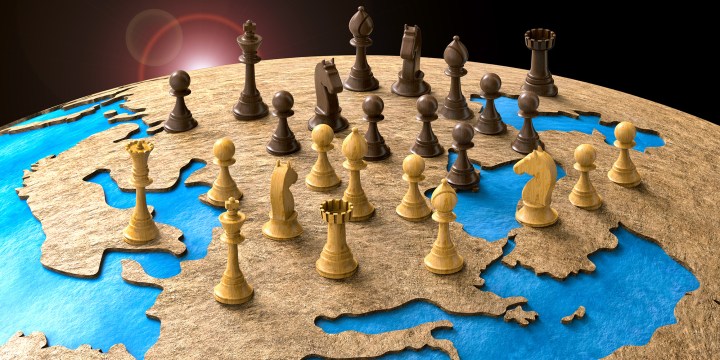RE-GLOBALISATION OP-ED
Every Chinese balloon shot down fast-tracks the shift to a politics-over-economy world order

Geopolitical risks are on the rise, foretelling the end of a 30-year period during which economic prosperity superseded political machinations. That means governments will drive the economic agenda and complexity and change lie ahead for the private sector, some of which is already under way.
Every sophisticated piece of weaponry sent to Ukraine and every Chinese balloon shot down by the US take us a step closer to an era in which geopolitics will supersede politics and governments will drive the policy agenda.
This “politics-over-economy” world order will replace 30 years during which geopolitics took second place in the race to achieve ever-stronger growth rates through globalisation, trade and free market economics.
Less obviously, it could upend, or at least have an impact on, the ubiquitous borderless technological transformation that has changed our lives so profoundly. Think TikTok, developed in Beijing and now available in more than 150 countries, and the groundbreaking digital cross-border payment alternatives.
In a recent Harvard Business Review piece, Hemant Taneja, the CEO and managing director of global VC firm General Catalyst, explored the impact of a re-globalising world on venture capital — the lifeblood of the innovation that has powered these disruptive forces and changed the face of many industries for the better.
He says: “In the era of economics over politics, it seemed like we were moving to a borderless world where the digital reigned over the physical, and where technologies easily proliferated across the globe through unencumbered markets.”
Instead, Taneja sees the “great power competition and increased nationalisation” that is the driving force behind re-globalisation as likely to “introduce increasingly complex, systemic challenges that will require new types of technology, innovation, and collaboration to solve”. The bottom line: venture capital investments will need more capital, greater collaboration, the patience to sit out more extended investment periods and greater attention to governance considerations.
Visit Daily Maverick’s home page for more news, analysis and investigations
Not only will more capital be needed but the cost of funding will increase in an era when money is no longer cheap. Collaboration will entail cooperation with government institutions driving investments into energy, technology and defence solutions at scale. Governance will require venture capitalists to take on a level of responsibility not experienced before, “given the profundity of these challenges and their potential implications on people and societies”.
Taneja defines re-globalisation as governments seeking to balance the benefits of globalisation, which is unlikely to disappear because the costs still outweigh the benefits, with greater independence and resilience, which would protect national interests from geopolitical threats.
Re-globalisation has been under way since Covid laid bare how reliant countries were on strategic resources supplied by other countries, in some cases with which they had less than ideal political relations. During the pandemic, it was the lack of availability of semiconductors, which are critical inputs for a broad swathe of industries and supplied by China, where a political power play was already occurring with the US. Other industries considered strategic include the health, technology and energy sectors, but deteriorating geopolitical dynamics could extend that list across a range of other industries.
Even in an era of politics over economics, however, countries will remain interdependent on certain crucial resources that cannot be sourced elsewhere and serve a global agenda. This is particularly pertinent in the minerals required for developing renewable sources of energy to make good on the commitments to achieve net zero carbon emissions by 2050.
In a podcast produced by consultancy firm McKinsey and themed “Globalisation is here to stay”, Olivia White, McKinsey Global Institute director and senior partner, in response to a question on whether the evolving state of global flows is helping or hindering the net-zero transition says: “The way I’d put it is, there is no way we move quickly toward a net-zero transition without global flows.”
She notes that minerals like nickel and lithium are processed in only a few countries in the world and the timeline from discovering a mineral to being able to produce it at scale is well over 16 years. Thus, White concludes: “In order for net zero to be attainable, we need to make sure that energy-generating technologies and fuels are able to flow across the world.”
But is that realistic, given Europe’s wake-up call when it felt the dire consequences of depending too heavily on Russian energy? It is more likely, and already evident, that countries will align with others on a case-by-case basis or groups of others in a cooperative structure, as long as political relations are comfortable, of course.
Examples include Quad, an alliance between the US, Japan, India and Australia; and Aukus, a security alliance between the US, UK and Australia. Closer to home, BRICS looks set to expand further if it allows Saudi Arabia, Iran and a host of other countries that have expressed their interest in joining, into the grouping.
Setting up regional groupings is also an alternative. White says: “There are a whole host of reasons some degree of regionalisation might help. You’ve got things closer to you.” But, she warns, then countries are dependent on “just a few points of potential weaknesses rather than a broad web, which, in general, is a more resilient and robust structure”.
Three decades of extraordinary economic growth in the absence of what Taneja calls “great power competition” highlighted the success of the conditions that facilitated that growth. Sadly, the profound deterioration in geopolitical stability foretells a new more complex, extremely uncertain and inevitably uncomfortable era, whether we like it or not. DM/BM


















Comments - Please login in order to comment.